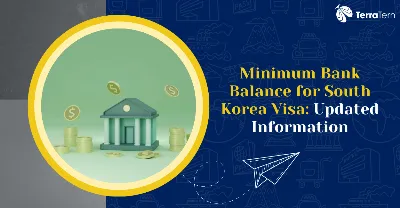Key Highlights
- How Much Bank Balance is Required to Visit South Korea Visa From India?
- How to Calculate Your Required Bank Balance for a South Korea Visa?
- What Bank Documents Do You Need for a South Korea Visa Application in 2025?
- What are the Alternative Financial Documents and Proof for a South Korea Visa in 2025?
- How Long Should Funds Be Maintained in Your Account for a South Korea Visa?
- Which Banks and Account Types Are Accepted for a South Korea Visa?
- What are the Common Mistakes That Lead to Visa Rejection Due to Financial Issues for South Korea Visa in 2025?
- How to Strengthen Your Financial Profile for South Korea Visa?
- What If You Don’t Meet the Minimum Bank Balance Requirements?
- What are the Bank Balance Requirements for South Korea Visa Special Categories in 2025?
- What are the Processing Timeline and Financial Document Verification for the South Korea Visa?
- Latest Statistics and Trends
- Conclusion
The minimum bank balance for South Korea visa from India is INR 70,000 per person, maintained for the last six months for tourist visas in 2025. Some sources use INR 50,000 for three months, but INR 70,000 is the safe standard and suggested by most Consultants. Student visas require significantly larger balances, ranging from approximately INR 12-15 lakh for degree programs (D-2 visa) to INR 6-9 lakh for language training (D-4 visa). You must maintain a consistent bank balance without sudden large deposits and provide stamped bank statements, proofs of income, and any other sources of funds (except loans) to support your travel expenses and demonstrate your ability to return to India.
How Much Bank Balance is Required to Visit South Korea Visa From India?
Minimum Bank Balance for South Korea Visa from India depends on the visa type and goes between 70,000 INR (tourist visa) and 15 lakh INR (student visa) in 2025. For every kind of visa, specific financial limitations are in place to ensure that individuals offered the visa can support themselves during their stay without engaging in illicit work activities.
|
Type of Visa |
Minimum Bank Balance |
Period of Stay in the Country |
Additional Requirements |
|
Tourist (C-3-9) |
70,000 per person |
6-month statements |
ITR, salary slips |
|
Business(C-3-4) |
1-2 lakh |
6-month statements |
Company invitation letter |
|
Student Degree (D-2) |
12-15 lakh |
full course period |
University fee receipt |
|
Language Training (D-4) |
6-9 lakh |
Duration of the course |
Language institute confirmation. |
|
Working Holiday (H-1) |
1.9 lakh(KRW 3 million) |
3-6 months |
Requirements: age 18-30 years. |
|
Employment (E-7) |
2-3 lakh |
6 months |
Job offer letter |
Tourist Visa (C-3) Financial Requirements
How much money do I need for a South Korea tourist visa? The minimum bank balance requirement is INR 70,000 per applicant, maintained consistently for the last six months. This amount must be reflected in your personal bank account without any sudden large deposits that could raise suspicion about borrowed funds.
Essential Financial Documents:
-
Bank statements for the last 6 months (stamped by the bank)
-
Income Tax Returns (ITR) for 2-3 years
-
Salary slips for the previous 3-6 months
-
Fixed deposit certificates (if applicable)
-
Mutual fund statements as supplementary proof
Additional Financial Proof Options:
-
Property ownership documents
-
Investment portfolio statements
-
Spouse/parent sponsorship with a notarised affidavit
-
Travel insurance covering INR 5 lakh minimum
The INR 1.5-2 lakh range is recommended for multiple-entry tourist visas or extended stays, as consulates prefer higher balances for frequent travellers. Applicants with a previous Korean visa or travel history to an OECD country may qualify for reduced documentation requirements.
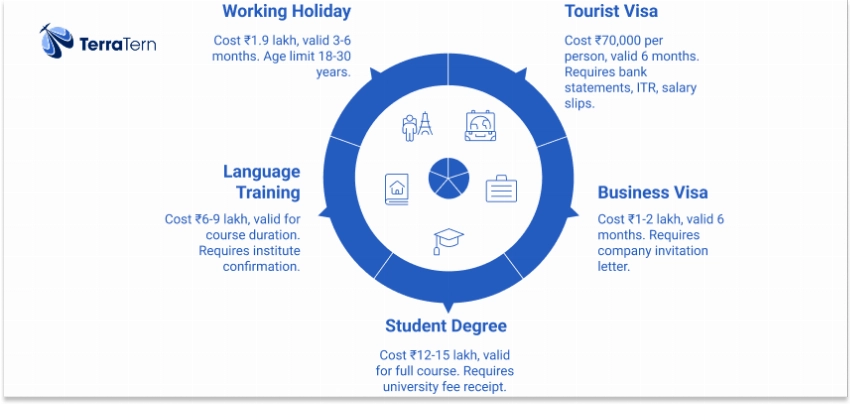
Student Visa (D-2) Bank Balance Requirements
Student visa financial requirements are substantially higher, with degree programs requiring INR 12-15 lakh depending on the university location and program type. Universities in Seoul and major cities typically require proof of USD 15,000 (approximately INR 12.5 lakh), while regional institutions may accept USD 13,000 (approximately INR 10.8 lakh).
University Category Breakdown:
-
National Capital Region Universities: USD 15,000-18,000 (INR 12.5-15 lakh)
-
Regional Universities: USD 13,000-15,000 (INR 10.8-12.5 lakh)
-
Private Universities: USD 16,000-20,000 (INR 13.3-16.6 lakh)
-
Technical/Specialised Programs: USD 18,000-22,000 (INR 15-18.3 lakh)
Alternative Financial Proof for Students:
-
Education loan sanction letter from recognised banks
-
Scholarship award letters (full or partial)
-
University assistantship confirmation
-
Parent/guardian sponsorship with income proof
-
Government scholarship programs (KGSP, university-specific)
Education consultants recommend maintaining 20% additional funds beyond the minimum requirement to account for currency fluctuations and unexpected expenses during the visa processing period.
Language Training Visa (D-4) Financial Proof
Language training visas require INR 6-9 lakh, depending on course duration and institute type. Short-term courses (3-6 months) typically require INR 6-7 lakh, while longer programs (1-2 years) need INR 8-9 lakh in demonstrated financial capacity.
Course Duration Financial Requirements:
-
3-Month Programs: INR 6-6.5 lakh minimum balance
-
6-Month Programs: INR7-7.5 lakh minimum balance
-
1-Year Programs: INR .5 lakh minimum balance
-
2-Year Programs: INR9-10 lakh minimum balance
Key Differences from Degree Programs:
-
Lower overall financial requirement than D-2 visas
-
Shorter bank statement history acceptable (3-6 months)
-
Language institute confirmation letter mandatory
-
Accommodation proof is often required upfront
-
Part-time work restrictions are more stringent
Financial Documentation for D-4 Visa:
-
Personal or sponsor bank statements
-
Language institute fee payment receipt
-
Accommodation booking confirmation
-
Return flight ticket or sufficient funds for ticket purchase
-
Health insurance coverage proof
The structured approach to meeting these financial requirements involves planning at least 6-12 months, maintaining consistent account activity, and gathering comprehensive documentation to support your visa application across all categories.
Also Read: South Korea Visa for Indians: Your Complete Guide
How to Calculate Your Required Bank Balance for a South Korea Visa?
Calculating the required bank balance for your South Korea visa involves more than just meeting the minimum bank balance for South Korea visa requirements. You need to factor in your trip duration, accommodation costs, daily expenses, and specific visa category to determine the optimal financial preparation strategy.
Step-by-Step Calculation Process:
-
Start with the base minimum requirement for your visa category
-
Calculate daily living expenses based on your destination cities
-
Add accommodation costs for your entire stay duration
-
Include visa processing fees and mandatory expenses
-
Add a 20-30% buffer for emergencies and currency fluctuations
-
Verify against consulate-specific requirements for your jurisdiction
Duration-Based Financial Planning
1-Week Tourist Trip Calculation:
-
Base Minimum Requirement: INR 70,000
-
Daily Expenses In Seoul: INR 4,000-6,000 (KRW 50,000-75,000)
-
Accommodation (Mid-range): INR 3,000-5,000 per night
-
Total Weekly Expenses: INR 49,000-77,000
-
Recommended Bank Balance: INR 1.2-1.5 lakh
1-Month Extended Stay:
-
Base Minimum Requirement: INR 70,000
-
Monthly Living Costs: INR 80,000-1.2 lakh
-
Accommodation (Monthly Rental): INR 40,000-80,000
-
Transportation And Miscellaneous: INR 15,000-25,000
-
Recommended Bank Balance: INR 2.5-3 lakh
3-Month Language Course (D-4 Visa):
-
Base Minimum Requirement: INR 6-7 lakh
-
Quarterly Living Expenses: INR 2.4-3.6 lakh
-
Course Fees: INR 1.5-2.5 lakh
-
Accommodation Deposit: INR 50,000-1 lakh
-
Recommended Bank Balance: INR 8-10 lakh
1-Year Degree Program (D-2 Visa):
-
Base Minimum Requirement: INR 12-15 lakh
-
Annual Living Expenses: INR 6-9 lakh
-
Tuition Fees: INR 4-8 lakh
-
Accommodation And Deposits: INR 2-3 lakh
-
Recommended Bank Balance: INR 18-22 lakh
Regional Cost Variations
|
City/Region |
Daily Budget (Budget) |
Daily Budget (Mid-range) |
Monthly Rent (Studio) |
|
Seoul |
INR 3,500-4,500 |
INR 5,500-7,500 |
INR 60,000-1 lakh |
|
Busan |
INR 2,800-3,800 |
INR4,500-6,000 |
INR 40,000-70,000 |
|
Daegu |
INR 2,500-3,500 |
INR 4,000-5,500 |
INR 35,000-60,000 |
|
Incheon |
INR 3,000-4,000 |
INR 5,000-6,800 |
INR 50,000-85,000 |
|
Gwangju |
INR 2,200-3,200 |
INR 3,800-5,200 |
INR 30,000-55,000 |
What are the Additional Expenses to Consider Beyond the Minimum Balance for a South Korea Visa in 2025?
Beyond the minimum bank balance for South Korea visa requirements, several additional costs significantly impact your total financial planning:
1. Mandatory Visa-Related Expenses:
-
Visa Application Fee: INR 4,200-5,600 depending on visa type
-
VFS Service Charges: INR 2,100-2,800 per application
-
Document Translation: INR 500-1,500 per document
-
Apostille/Attestation: INR 1,000-3,000 for educational documents
-
Medical Examination: INR 3,000-8,000 for specific visa categories
2. Travel Insurance Requirements:
-
Minimum Coverage: INR 5 lakh medical coverage mandatory
-
Comprehensive Plans: INR 2,500-5,000 for short trips
-
Annual Multi-trip: INR 8,000-15,000 for frequent travellers
-
Student Insurance: INR 15,000-25,000 per year
3. Accommodation Deposits and Advance Payments:
-
Hotel Booking: 10-20% of the total stay cost
-
Goshiwon/Dormitory Deposits: INR 20,000-50,000
-
Monthly Apartment Deposits: 2-6 months' rent in advance
-
Utility Deposits: INR 10,000-20,000 for long-term stays
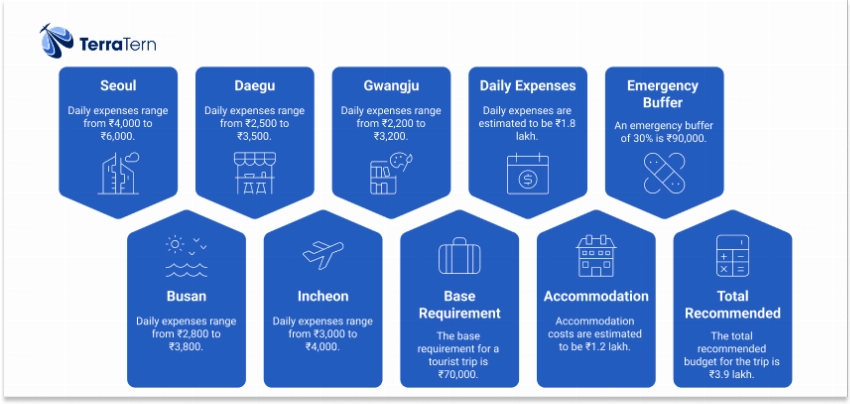
4. Emergency Fund Calculations:
-
Medical Emergencies: INR 50,000-1 lakh reserve
-
Flight Changes/Extensions: INR 30,000-60,000
-
Unexpected Accommodation: INR 15,000-25,000
-
Communication/Internet Setup: INR 5,000-10,000
5. Financial Buffer Recommendations:
-
Tourist Visas: Add 30% to calculated expenses
-
Student Visas: Add 25% to tuition and living costs
-
Business Visas: Add 40% for networking and unexpected meetings
-
Long-term Visas: Add 20% for settlement expenses
6. Practical Calculation Example (1-Month Tourist Trip):
-
Base Requirement: INR 70,000
-
Daily Expenses (Seoul, Mid-Range): INR 6,000 × 30 = INR 1.8 lakh
-
Accommodation: INR 4,000 × 30 = INR 1.2 lakh
-
Visa Fees And Insurance: INR 10,000
-
Emergency Buffer (30%): INR 90,000
-
Total Recommended Balance: INR 3.9 lakh
7. Monthly Maintenance Strategy:
-
Months 1-3: Build a base minimum balance
-
Months 4-5: Add trip-specific expenses
-
Month 6: Finalise documentation with 20% extra buffer
-
Application Month: Ensure all funds are liquid and accessible
This comprehensive approach ensures you not only meet the minimum bank balance for South Korea visa requirements but also demonstrate genuine financial capacity to support your entire stay without financial stress.
What Bank Documents Do You Need for a South Korea Visa Application in 2025?

Meeting the minimum bank balance for South Korea visa requirements involves more than just having sufficient funds—you need proper documentation to prove your financial stability. The Korean consulates require comprehensive financial documentation that demonstrates both your ability to fund your trip and your intention to return to India.
Essential Bank Documents Checklist:
1. Bank Statements (3-6 months) - stamped and signed by bank authority
2. Income Tax Returns (ITR) - last 2-3 years
3. Salary Slips - last 3-6 months for employed applicants
4. Fixed Deposit Certificates - if available as supplementary proof
5. Investment Statements - mutual funds, stocks, bonds
6. Sponsor Affidavit - if funds are from a parent/spouse account
Bank Statement Requirements and Format for South Korea Visa
The bank statement requirements and format for South Korea visa:
1. Duration and Coverage Requirements:
-
Tourist Visas: 6-month bank statements mandatory
-
Student Visas: 3-6 months, depending on consulate requirements
-
Business Visas: 6-month statements with company financial documents
2. Mandatory Statement Features:
-
Bank Stamp and Signature: Original wet stamp from the bank authority required
-
Account Holder Name: Must match passport exactly
-
Account Number: Can be partially masked for security, but bank details must be visible
-
Transaction History: Complete record of all debits and credits
-
Current Balance: Must meet or exceed the minimum bank balance for South Korea visa requirements
3. Format Specifications:
-
Original or Certified Copy: Photocopies must have a bank stamp and an authorised signature
-
Bank Letterhead: Official bank logo and branch details mandatory
-
Date Range: Consecutive months without gaps in coverage
-
Currency: INR statements preferred; foreign currency accounts need conversion rates
4. Online vs. Physical Statements:
-
E-Statements Acceptable: If printed on official bank letterhead with all required information
-
Bank Certification Required: Online printouts must be stamped at the bank branch
-
Account Summary Insufficient: Detailed transaction history needed, not just balance summaries
-
Mobile App Screenshots: Not accepted under any circumstances
What are the Alternative Financial Documents and Proof for a South Korea Visa in 2025?
Beyond basic bank statements, several alternative documents can strengthen your financial profile and support your minimum bank balance for a South Korea visa application:
1. Fixed Deposit Certificates:
-
Original FD Receipts: Bank-issued certificates with maturity details
-
Premature Withdrawal Options: Documents showing liquidity access if needed
-
Interest Certificates: Annual interest statements for additional income proof
-
Joint FD Clarification: If jointly held, provide relationship proof
2. Investment Portfolio Documentation:
-
Mutual Fund Statements: Last 6 months showing current NAV values
-
Stock Portfolio: Demat account statements with current market values
-
Bond Certificates: Government or corporate bonds as asset proof
-
Insurance Policies: Life insurance with surrender value documentation
3. Loan and Credit Documentation:
-
Education Loan Sanction: For student visas, approved loan letters from recognised banks
-
Credit Card Statements: Supplementary proof of spending capacity (not primary requirement)
-
Personal Loan Approvals: Pre-approved loans showing creditworthiness
-
Property Loan Statements: Home loan documentation as asset backing
4. Sponsorship and Family Support:
-
Parent/Spouse Bank Statements: 6 months for family-sponsored applications
-
Sponsorship Affidavit: Notarised document accepting financial responsibility
-
Relationship Proof: Marriage certificate, birth certificate for family sponsors
-
Sponsor Income Proof: ITR, salary slips of the sponsoring family member
5. Scholarship and Educational Funding:
-
University Scholarship Letters: Full or partial tuition coverage documentation
-
Government Scholarship Awards: KGSP or other official program confirmations
-
Corporate Sponsorship: Company-funded education or training program letters
-
Research Grants: Academic funding for research-based programs
The key to successful financial documentation lies in demonstrating consistent, legitimate income sources that support both your minimum bank balance for South Korea visa requirements and your overall financial stability as a responsible traveller.
Also Read: Korea Visa for Indians: Experts' Complete Visa Guide
How Long Should Funds Be Maintained in Your Account for a South Korea Visa?
For most South Korea visa categories filed in India, maintain the required funds for at least the period covered by the bank statements requested—typically six consecutive months for C-3 tourist/business applications—because officers assess consistency, not just a one-day balance for the minimum bank balance for South Korea visa. Some categories (e.g., F-3 dependents) now explicitly require showing the average balance over the past six months, which effectively enforces “seasoning” of the fund rather than last-minute top-ups. While many centres also accept a balance certificate, it should be issued recently—ideally within 30 days—and short-term deposits/withdrawals can trigger reassessment during review, so a steady history matters.
Bank Statement Timeline and Fund History
-
Standard tourist C-3 checklists require a “Recent Bank Statement of last 6 months” and specify it must carry the bank’s stamp and authorised signature, ensuring the consulate can verify both continuity and authenticity of funds over time.
-
Parallel checklists for India centres repeat the same 6-month rule, with explicit “6 months’ bank statement” requirements, and note that the bank’s original seal/signature is required, which helps prevent the acceptance of partial or manipulated extracts.
-
Several centres’ instructions and service providers advise against sudden large deposits and prefer a stable pattern of inflows/outflows; some even recommend a stamped 3-month minimum in specific channels, but 6 months is the widely enforced baseline for C-3 cases.
-
For dependents, the updated 2025 F-3 guidance introduced a requirement to show the average balance for the last six months, underscoring that officers look beyond a snapshot balance to the fund's history and stability.
Dealing with Insufficient Bank Balance
-
Use a sponsor for study routes, balance certificates can be in the name of the applicant or parents/siblings, and this is explicitly accepted under student financial guidelines; submit the sponsor’s 3–6 month statements and relationship proof to align with the minimum bank balance for South Korea visa expectations.
-
Provide sanctioned education loan letters or scholarship/award notices for student routes (D‑2/D‑4); these are recognised forms of financial support when liquid cash is short, provided documents are current and verifiable.
-
For tourists/business travellers, attach complete 6‑month statements, ensure bank stamping, and add legitimate assets (fixed deposits/investments) only as supplements; avoid last‑minute transfers that can be viewed as borrowed funds without seasoning.
Which Banks and Account Types Are Accepted for a South Korea Visa?

Korean consulates in India accept bank statements from mainstream, RBI-regulated public and private banks as long as they meet format rules (recent 3–6 months, stamped, signed, legible), with no official whitelist of specific Indian banks published for tourist or student files, so the focus is on document quality rather than the brand of bank for meeting the minimum bank balance for South Korea visa requirement. Savings and current accounts are both acceptable for proof of funds; for students, either the applicant’s or a family member’s account is allowed when properly documented, and universities/consulates often accept balance certificates in place of raw statements if issued recently and in the correct currency. Foreign currency accounts are acceptable when the bank issues a balance certificate in KRW or USD, with currency conversion handled in accordance with institutional rules. Joint accounts and multiple accounts can be used if the relationship and ownership are clearly evidenced in the file.
Preferred Banks and Account Formats for South Korea Visa
The preferred banks and accounts format for South Korea visa:
-
There is no officially published list of “accepted Indian banks”; consulates and VFS/BLS checklists require 3–6 months of recent, stamped bank statements and do not specify particular bank brands, so applicants typically use central public or private scheduled banks to satisfy the minimum bank balance for South Korea visa proofs.
-
Digital-only bank statements have faced acceptance issues in some jurisdictions abroad, so traditional branch-issued statements with a wet stamp/signature remain the safest option for visa files, even though Indian centres do not require specific banks to be named.
-
Statement format basics: last 6 months, complete transaction history, name matches passport, bank logo/letterhead, and bank stamp/signature; these criteria are consistently referenced across Indian application guidance and student/long-stay documentation.
-
Using more than one account is fine: combining payroll, savings, and travel accounts can provide a clearer liquidity picture. Ensure each statement is complete and stamped if printed from an online banking account.
Foreign Currency Accounts and Multi-Currency Options for South Korea Visa
Foreign currency accounts and multi-currency options for South Korea visa:
-
For university-verified student files (D-2), balance certificates must be issued within 30 days and stated in KRW or USD only; institutions like Korea University do not accept other currencies, and exchange rates are applied per specific cut-off dates published by the school or immigration office.
-
If funds are held in USD/EUR accounts in India, submit a bank balance certificate in KRW or USD; for tourist/business applicants, INR statements are standard, but a balance certificate or annotation that converts to KRW/USD improves clarity against the minimum bank balance for South Korea visa checks.
-
When presenting foreign currency funds, keep the certificate recent and ensure the holder's name matches the passport; for student applicants abroad, a parent’s foreign-currency account is allowed with family relationship proof and passport copy per institutional guidance.
Also Read: Visa Fees for All Countries from India: Latest Guide
What are the Common Mistakes That Lead to Visa Rejection Due to Financial Issues for South Korea Visa in 2025?
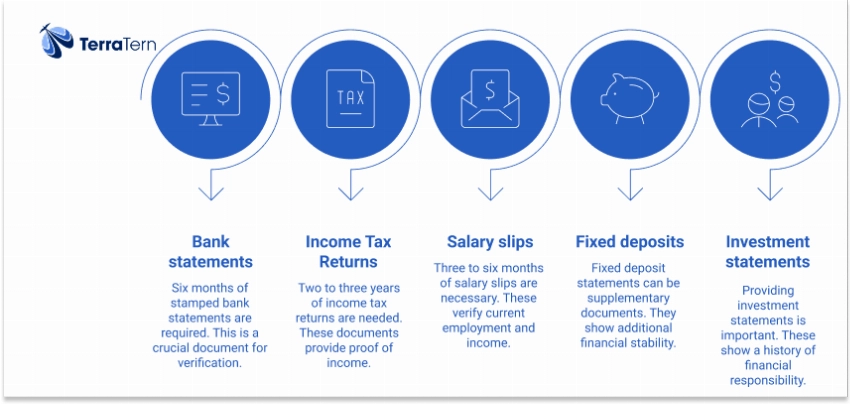
Most South Korean visa refusals tied to financial issues stem from insufficient or unstable funds, unstamped or incomplete bank statements, unexplained recent deposits, and missing translations or authentications required to verify financial documents against the Minimum Bank Balance for South Korea Visa checks.
-
Submitting fewer than six consecutive months of stamped statements, or statements with gaps, which fail basic checklist scrutiny for C‑3 applications in India.
-
Showing balances below or barely at the threshold without seasoning, or adding large last‑minute deposits that appear borrowed or unverifiable to officers.
-
Missing translations or recognised formats (English/Korean for student files), unclear currency, or not following university/consulate formatting rules for financial proof.
-
Relying on unverified sponsor funds without relationship proof, income evidence, or a properly prepared support letter weakens the credibility of the financial plan.
-
Using altered, inconsistent, or non‑verifiable documents can trigger immediate refusal and potential blacklisting for document fraud concerns.
Bank Statement Errors and How to Avoid Them for South Korea Visa
The bank statement errors are:
-
Incorrect Duration: Tourist/business files typically require “Personal Bank Statement (6 Months)” and are rejected when only 1–3 months are provided, even if the closing balance appears high relative to the minimum bank balance for South Korea visa.
-
Missing Bank Stamp/Signature: Universities and consulates require original statements or originals with the bank’s stamp/signature; e-statements must be branch-stamped to be acceptable.
-
Wrong Date Range Or Gaps: Ensure consecutive months with complete transaction history; gaps or partial pages undermine authenticity and continuity.
-
Unexplained Spikes: Sudden, large deposits before printing statements raise suspicion of borrowed funds. Provide a clear paper trail or avoid last-minute transfers.
-
Name/Currency Mismatches: The account holder's name must match the passport, and student files often require balances stated in KRW or USD with conversion per institutional rules.
What are the Financial Document Authentication Issues for South Korea Visa?
The financial document authentication issues for South Korea visa are:
-
Notarization and Apostille: Missions may request notarization or apostille for documents issued abroad (e.g., sponsor letters, financial certificates), and Indian documents can require MEA apostille when specified by the authority reviewing the file.
-
Translation Standards: Financial documents for student (D-2/D-4) routes must be in English or Korean. If not, submit recognised translations, often accompanied by an apostille on both the original and translation, where required by the institution.
-
Sponsor Evidence: When relying on parents/guardians, attach a formal support letter along with bank statements and proof of relationship; some advisors recommend notarised affidavits to strengthen credibility.
-
University Specifics: Many schools mandate an original bank statement issued within one month, bank stamp/signature, and amounts in KRW/USD with explicit minimums (e.g., KRW 10–20 million), rejecting non‑conforming formats.
How to Strengthen Your Financial Profile for South Korea Visa?
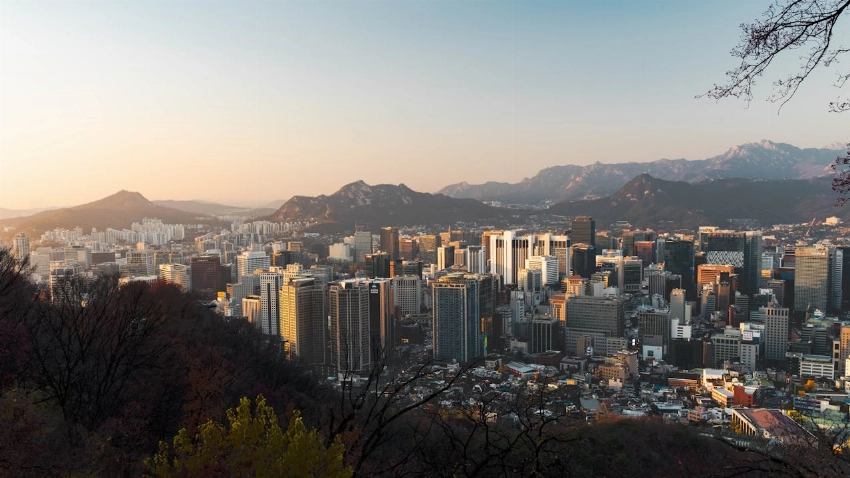
-
Maintain a consistent closing balance for at least the last 6 months, rather than topping up right before printing statements to satisfy the minimum bank balance for South Korea visa checks.
-
Include 2–3 years of Income Tax Returns and 6–12 months of salary slips to demonstrate steady income and reduce financial scrutiny.
-
Use bank statements that are stamped and signed by the bank; branch-certified e-statements are acceptable when properly endorsed.
-
If funds are distributed, submit complete 6‑month statements for each account; for student routes, balance certificates must be recent and in KRW/USD per institutional rules.
-
Add credible secondary assets (FDs/mutual funds) and, for students, sanctioned education loans or scholarship letters to bolster proof of means.
Building a Strong Financial Portfolio
-
Keep balances higher than the practical floor for at least 6 months; applicants with steady averages face fewer document queries than those with last‑minute spikes.
-
Combine multiple instruments: liquid savings/current accounts for accessibility, plus FDs and investment statements as supportive reserves to exceed the minimum bank balance for South Korea visa.
-
Attach employment proof, such as an employment certificate and 6–12 months of salary slips, to corroborate regular inflows and strengthen ties to return.
-
Business owners should include company registration, a brief business profile, and personal/company ITRs to evidence legitimate income streams.
-
For dependents, note the updated guidance, which emphasises a six-month average balance, underscoring the importance of seasoning rather than snapshot funds.
Supporting Financial Documents and Evidence
-
Income Tax Returns: Submit at least 2 years (often 2–3 years) to validate income history and align with checklist expectations.
-
Salary Slips: Provide 6 months to 1 year of slips as requested by the centre checklists to match living cost claims with income.
-
Bank Statements: Ensure six consecutive months of complete transaction history, with a bank stamp/signature; unstamped or partial statements risk refusal.
-
Fixed Deposits/Investments: Add FD certificates or mutual fund statements as supplementary liquidity, not substitutes for the 6‑month bank history.
-
Student Proofs: Use balance certificates issued within 30 days stated in KRW/USD; parent sponsorship allowed with family relation proof, and some universities require one account crossing KRW/USD 20,000.
Also Read: How Much Bank Balance Is Required For A Canada Visitor Visa?
What If You Don’t Meet the Minimum Bank Balance Requirements?
Consulates accept credible alternatives—parent/guardian sponsorship, education loans, and scholarships—provided the paperwork proves real access to funds, the relationship, and covers the full estimated cost for the visa period beyond the minimum bank balance for South Korea visa. For students, Korean universities and missions outline precise formats and timelines for bank certificates, sponsor letters, and scholarship notices, which must be followed precisely.
Sponsor and Guarantor Options
-
Parent/Family sponsorship is permitted for student routes when the sponsor provides a signed support letter/affidavit, six months of bank statements, identity and relationship proof, and meets the stated minimums in USD/KRW or equivalent for the study period.
-
University guidance clarifies that the account can be in the name of the applicant or their parents, provided a bank balance certificate is issued within 30 days and denominated in either KRW or USD for acceptance by admissions/immigration reviewers.
-
Some centres explicitly advise that students under 30 should include their parents' financial documents and a sponsorship letter, reinforcing parental sponsorship as a standard pathway when personal funds are insufficient.
-
Use institution-provided templates where available; for example, Korea University’s Statement of Financial Sponsorship requires an original sponsor bank statement/certificate showing at least USD 20,000 and certification by the issuing bank.
-
For non-student short stays, sponsors may be considered on a case-by-case basis; however, officers still expect recent stamped bank statements and consistency with the minimum bank balance for South Korea visa checks from either the traveller or the sponsor.
Required sponsor documents (typical for D-2/D-4):
-
Sponsor letter/affidavit of support with a signature and contact details, plus a photocopy of the sponsor’s ID/passport, and proof of the relationship (e.g., birth or family certificate).
-
Sponsor’s 6-month bank statements and, if applicable, ITR/salary evidence to demonstrate ongoing capacity, following university/mission format rules and currency denomination guidance.
Educational Loans and Alternative Funding
-
Consulates accept a certificate of student loan as proof when personal balances are short, provided the loan amount covers tuition and living costs as specified in D‑2 guidance for capital-region versus local-region universities.
-
The loan certificate must be official, recent, and show the sanctioned amount, lender details, and applicability for study in Korea; attach personal statements for the last six months if requested by the mission.
-
Time the loan sanction to meet issuance windows: some missions won’t accept bank/loan statements older than two weeks at filing, so plan the sanction date accordingly.
-
Ensure the combined evidence (loan + partial balance + sponsor if needed) meets the full financial threshold in USD/KRW to satisfy the minimum bank balance for the South Korea visa expectation for the entire study period.
What are the Bank Balance Requirements for South Korea Visa Special Categories in 2025?

Korean missions review funds alongside occupation proof and consistency in bank history; use the minimum bank balance for South Korea visa as a baseline, then add category-specific documents below.
|
Applicant Category |
Typical Financial Proofs |
Extra Documents are Often Requested |
|
Working professionals (C‑3/C‑3‑1) |
Personal bank statement for 6 months showing stable balance; aim to exceed the practical minimum and keep funds seasoned across the whole period. |
Employment certificate and 6 months of salary slips; 2–3 years of ITR to verify steady income and purpose of travel. |
|
Self‑employed/business owners |
Personal bank statement 6 months; consider adding business account history to demonstrate turnover and liquidity when near the minimum bank balance for South Korea visa. |
Company registration (e.g., MSME), business profile, and personal/company ITRs for 2–3 years to authenticate income streams. |
|
Students (D‑2/D‑4) |
Bank certificate/statement issued within 1 month; many schools require a minimum of KRW 10,000,000 and allow parent accounts with proof of relation. |
Parent financial support docs (employment and income certificates, passport copy, family relationship proof) and statements in KRW/USD as specified by institutions. |
|
Dependents (F‑3) |
Average balance across the last 6 months is reviewed under updated 2025 guidance, so consistent funds matter more than a one‑day closing balance |
Proof of relationship and the primary visa holder’s status; additional documents may be requested during adjudication. |
|
Retirees |
6 months of personal bank statements with stable balances; provide occupation proof consistent with status (e.g., letter or documentation evidencing retirement income) per the checklist’s occupation proof requirement. |
Where applicable, submit ITRs or regular income evidence to corroborate living costs for the duration of the visit. |
Working Professionals vs. Self Employed Applicants
-
Salaried applicants should include a 6‑month stamped personal bank statement, 6 months of salary slips, an employment certificate, and 2–3 years of ITR to demonstrate steady inflows and financial stability above the minimum bank balance for South Korea visa.
-
Self‑employed applicants should attach a 6‑month personal bank statement, company registration (and business profile), and personal/company ITRs to prove legitimate, ongoing income that aligns with trip costs.
Student and Dependent Applicant Requirements
-
Students commonly need a bank statement/certificate issued within 1 month showing at least KRW 10,000,000 in the applicant’s or parent’s name, plus parent employment and income certificates, family relationship proof, and statements in KRW/USD as required by schools and missions.
-
Dependents must evidence financial capacity via six‑month average balances and updated 2025 F‑3 criteria, and consulates may request further proof to validate sponsor support and living cost coverage.
Also Read: Indian Passport Renewal Document Checklist: Latest Guide
What are the Processing Timeline and Financial Document Verification for the South Korea Visa?
Expect 7–15 working days for routine processing in India, noting mission workload and that additional verification may extend timelines; filing 3–4 weeks before travel is prudent.
Consulate Verification Process for Financial Documents
-
Officers check for consecutive 6‑month statements with bank stamp/signature, full transaction history, matching names, and occupation proof; incomplete or unstamped statements risk refusal or re‑queries.
-
Universities and language centres require bank statements/certificates issued within one month and often in KRW/USD; parent sponsorship must include relation and income proofs, which are scrutinised for authenticity.
-
Missions may delay or request additional documents if anything is unclear or unverifiable, as explicitly stated in the submission guidance, which can extend the processing time.
Expedited Processing and Express Visa Options
-
Standard processing in India is commonly 7–15 working days via agencies; anecdotal fastest cases report around five working days when files are complete and volumes are low.
-
Some Indian jurisdictions list “Express service three working days,” but express availability and speed are mission‑specific and not guaranteed; applicants should confirm locally and anticipate extra fees and stricter document checks.
-
Certain consulates explicitly state “No urgent/express service” for C‑3 categories, so eligibility for faster processing depends on the issuing mission’s policy and cannot be assumed.
Latest Statistics and Trends
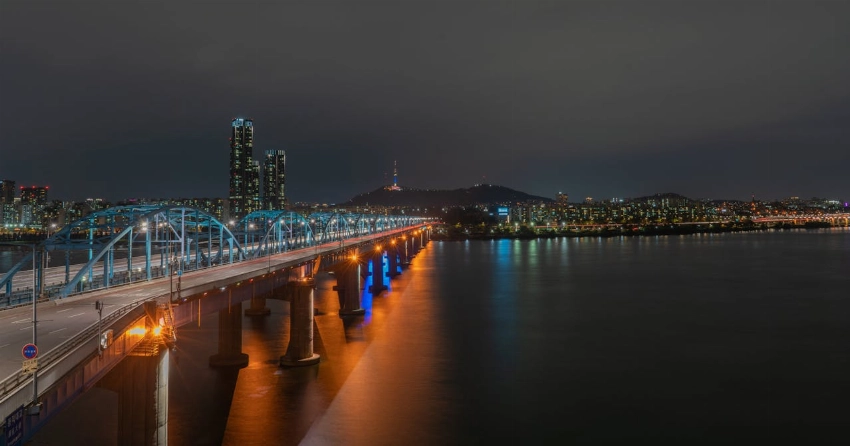
-
South Korea visa application fees: INR 3,400 for short-term single entry, INR 5,100 for long-term visas
-
Average visa processing time: 2-4 weeks through VFS Global centres
-
Updated financial requirements, effective 202,5, show increased scrutiny on bank statements
-
Digital banking statements are now accepted with proper bank stamps and signatures
-
New policy changes allow alternative financial documentation for students
Also Read: Sweden Tourist Visa from India: Latest Expert Guide
Conclusion
South Korea visas are approved on overall financial credibility, not a single number—so aim above the minimum bank balance for South Korea visa, keep funds stable across consecutive months, and ensure statements are stamped, legible, and consistent with income and itinerary. Strengthen your files with ITRs, salary slips, or business proofs, and utilise fixed deposits/investments as supplementary liquidity.
For students and dependents, follow currency and issuance-window rules for bank certificates, and add parent sponsorship or scholarships as needed. Always verify consulate- and university-specific checklists before filing and plan documents early to avoid last-minute gaps.
Contact TerraTern for more information on the Minimum Bank Balance for South Korea Visa from India: Complete 2025 Guide.
